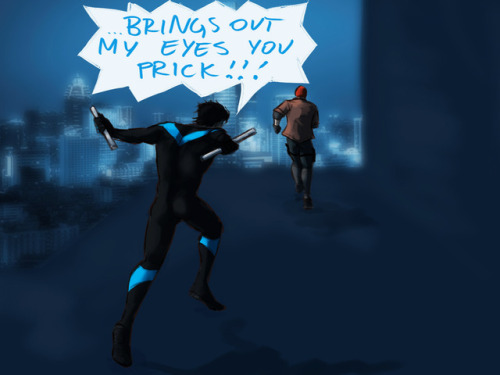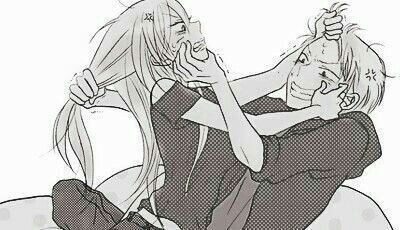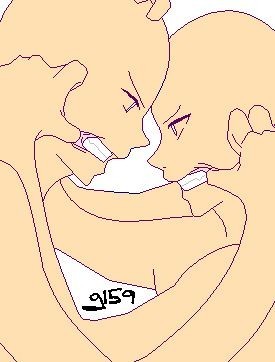I Illustrated This Post by @iminthedance



i illustrated this post by @iminthedance
(and took the liberty of changing the colour to the one he’s actually wearing here)
More Posts from Theavatarthatdies and Others
I am so stressed out rn. I have a massive pile of coursework to finish and the exams are going to be the death of me
Skip Google for Research
As Google has worked to overtake the internet, its search algorithm has not just gotten worse. It has been designed to prioritize advertisers and popular pages often times excluding pages and content that better matches your search terms
As a writer in need of information for my stories, I find this unacceptable. As a proponent of availability of information so the populace can actually educate itself, it is unforgivable.
Below is a concise list of useful research sites compiled by Edward Clark over on Facebook. I was familiar with some, but not all of these.
⁂
Google is so powerful that it “hides” other search systems from us. We just don’t know the existence of most of them. Meanwhile, there are still a huge number of excellent searchers in the world who specialize in books, science, other smart information. Keep a list of sites you never heard of.
www.refseek.com - Academic Resource Search. More than a billion sources: encyclopedia, monographies, magazines.
www.worldcat.org - a search for the contents of 20 thousand worldwide libraries. Find out where lies the nearest rare book you need.
https://link.springer.com - access to more than 10 million scientific documents: books, articles, research protocols.
www.bioline.org.br is a library of scientific bioscience journals published in developing countries.
http://repec.org - volunteers from 102 countries have collected almost 4 million publications on economics and related science.
www.science.gov is an American state search engine on 2200+ scientific sites. More than 200 million articles are indexed.
www.pdfdrive.com is the largest website for free download of books in PDF format. Claiming over 225 million names.
www.base-search.net is one of the most powerful researches on academic studies texts. More than 100 million scientific documents, 70% of them are free

Childhood ruined
#intimacy
𝐏𝐑𝐎𝐌𝐏𝐓𝐒 𝐓𝐇𝐀𝐓 𝐌𝐀𝐊𝐄 𝐌𝐄 𝐆𝐎 👀.
okay so i got like, three books delivered this week, and in anticipation i reread another book that i had, and lads, let me tell ye, it was like quicksand. so now i have a list, some from my head, many from my wonderful friends’ heads, of prompts that basically made us all very soft or very “pleasantly scandalized rich lady from the sixties who just found out a juicy bit of goss about the new neighbor”. i hope ye like them! (DO NOT ADD TO THE LIST. I WILL MAKE A PART TWO. AND THREE. AND FOUR. MANY MANY PARTS. EVENTUALLY. )
[ HAIR ]: sender slowly reaches out to catch a loose strand of the receiver’s hair and tuck it gently and securely back behind their ear, letting their touch linger afterwards. (if the receiver has short hair, then the sender reaches out and gently runs their fingers through their hair to smooth it back.)
[ CLOSE ]: while standing remarkably close to one another, the sender is unable to stop themselves from running their gaze across the receiver’s body, lingering for a moment on their lips, before returning to initiate prolonged, intense eye contact.
[ CHIN ]: as they stand close to one another, the sender hooks a finger and tenderly lifts the receiver’s chin, tilting it up so that they can look at one another, and running a thumb across their skin lightly.
[ THUMB ]: while cupping the receiver’s cheek in their hand, the sender slowly glides their thumb across their cheekbone in a tender, sweeping caress.
[ WOUND ]: upon noticing a recent injury on the receiver’s person, the sender carefully moves closer, running a thumb (or hand) across the wound in a gentle, troubled manner.
[ INHALE ]: while standing in very close quarters to the receiver, the sender shakily inhales with desire/anticipation as they realize how intimately close they are to one another.
[ DANCE ]: when alone together (e.g. the bedroom, the kitchen, literally anywhere once they’re alone) the sender takes the receiver’s hand, and pulls them into a graceful yet intimate dance as a spontaneous act.
[ BARE ]: as they get undressed, the sender gently places a soft, tender kiss against the receiver’s bare shoulder.
[ SCAR ]: noticing a scar on the receiver’s skin, the sender tentatively stops them from covering it up, and rests a gentle, soft kiss over it.
[ FOREHEAD ]: placing a hand on the back of the receiver’s neck, the sender guides them close and rests their foreheads together.
[ PALM ]: taking the receiver’s hand, the sender brings it to their mouth, and places a tender kiss against the receiver’s palm.
[ LINGER ]: taking the receiver’s hand, the sender lifts it to their lips, and gently kisses their knuckles, lingering for a moment before withdrawing.
[ BEHIND ]: upon entering the same room as the receiver, the sender steps behind them, and winds their arms around the receiver’s waist, drawing them close against them.
[ WAIT ]: realizing the receiver is about to leave the room, the sender hastily reaches out and catches their wrist, preventing them from continuing their departure.
[ ARM ]: after holding their hand, the sender releases the receiver, but slowly glides their hand up the full length of their arm, lingering on the upper arm, then the shoulder, then resting their touch against the side of their neck.
[ HOLD ]: while close to the receiver, the sender wordlessly takes a hold of their hand, for no other purpose than to be holding it.
[ PLAY ]: while sitting together, the sender absently lifts the receiver’s hand, idly running their fingertips across the lines of their palms, mapping out every inch of their hand with slow, lazy touches.
[ GUIDE ]: in the process of guiding the receiver through a crowded place, the sender’s hand protectively grazes against the small of their back
[ TOUCH ]: while touching the receiver’s waist, the sender’s hand briefly dips beneath the hem of their shirt, skimming briefly across the bare skin of their waist.
[ CUP ]: bringing both hands up to cup the receiver’s face, the sender draws them in closer to them in order to get a better look at their face.
[ TUG ]: the sender tugs the receiver close against them by resting a hand against the small of their back, pulling them flush against their body.
[ HUSH ]: while standing close to one another and hiding from pursuers, the sender reaches up and places a finger against the receiver’s lips to prevent them from speaking and revealing their location.
[ WRAP ]: when sitting astride a horse/motorcycle/etc. together, the sender reaches back, takes the receiver’s wrists, and gently pulls their arms around the sender’s waist in an embrace designed to keep the receiver safe, despite feeling remarkably intimate.
Okay fuck it if this post reaches 666k notes by the end of 2023 I'll practise basic self care
Why 666k? Because it's funny and impossible so good fucking luck
Tsukki being the biggest meance
Haikyuu boys x you + enemies to lovers
<♡><♡><♡><♡><♡><♡><♡><♡><♡><♡><♡><♡>

-TSUKISHIMA; Kuroo; Atsumu; tendou; Hanamaki; Hinata; goshiki; Futakuchi; kenma.

-TSUKISHIMA; Semi; Osamu; Kindaichi; Komori; Ukai; Yahaba.

-TSUKISHIMA; Aran; Daichi; Ennoshita; Hirugami; Akaashi; Oikawa; Kita; Kunimi.

-TSUKISHIMA; Bokuto; Sugawara; Yamaguchi; Lev; Suna; Shirobu.

-TSUKISHIMA; Iwaizumi; Yaku; Ushijima; Aone; Matsukawa; Kageyama; Kyotani; Sakusa.
Azula as the Ophelia of the Avatarverse (Warning: possible mention of self-harm and/or suicide)
If I had to compare Azula to a well-known literary character, it’d be Ophelia from Hamlet. It might seem weird to some people to read that. On the surface of the narrative, Ophelia is very much a passive victim, and Azula would set you on fire if you ever described her that way.
The worst thing to call somebody is crazy. It’s dismissive. “I don’t understand this person. So they’re crazy.” That’s bullshit. These people are not crazy. They strong people. Maybe their environment is a little sick. (source)
Something is rotten in the state of Denmark. (source)
Banishing me was they best thing you did for my life. It put me on the right path. (source)
Nevertheless, there are strong parallels between the two in that they’re both teenaged girls whose mental deterioration is directly connected to their toxic environments and the failure of the adults in their lives to intervene before a major mental health crisis.
Even so, most analysis of these characters take a more individualistic approach, aiming to understand what’s wrong with Azula or Ophelia instead of examining the conditions that lead to the outcomes of these characters. In essence, they ask, “What is her problem?” when a more fruitful question might be, “What’s going on that allows this to happen?”
When Ophelia appears onstage in Act IV, scene V, singing little songs and handing out imaginary flowers, she temporarily upsets the entire power dynamic of the Elsinore court. When I picture that scene, I always imagine Gertrude, Claudius, Laertes, and Horatio sharing a stunned look, all of them thinking the same thing: “We fucked up. We fucked up bad.” It might be the only moment of group self-awareness in the whole play. Not even the grossest old Victorian dinosaur of a critic tries to pretend that Ophelia is making a big deal out of nothing. Her madness and death is plainly the direct result of the alternating tyranny and neglect of the men in her life. She’s proof that adolescent girls don’t just go out of their minds for the fun of it. They’re driven there by people in their lives who should have known better. (source)
You could argue that Ophelia’s fate is a consequence of the rottenness in Denmark. Thus, her decline and death can be read as an indictment of the court at Elsinore. Ophelia clearly needed help from the moment she found out Hamlet killed her father. But where was everyone? What were they doing? Why didn’t someone say or do something?
The same thing can be said about Azula. What befalls Azula at the end of the show is a direct result of the corruption of Fire Nation society. That moment by the bonfire in “The Beach” was a cry for help, but why did no one see it for what it was? Why did no one even attempt to help? Where were the grownups who could have stepped in? True, it would’ve been tricky considering her disposition and social status, but not impossible.
More importantly, what does all of this say about the societies that Ophelia and Azula live in? What’s going on in a society where people so clearly in need of help aren’t getting it? What does that say about who that society deems indispensable and who it deems disposable?
How are we encouraged by the narrative and by audience reactions to notice Ophelia’s vulnerability but not Azula’s? How does this reflect our society’s attitudes towards teenaged girls who are mentally ill? What are some things we can do differently to push back against those attitudes?
reblog if you’ve read fanfictions that are more professional, better written than some actual novels. I’m trying to see something
Finally reading V for Vendetta (absolutely incredible 10/10 would recommend) and I can no longer deny the fact that Jason Todd is 100% a V kinnie I would not be surprised if he based his entire personality off of him
Watching Assassination Classroom for the first time and I’ll tell you, I don’t know what I was expecting from an anime where the summary is “teacher is teaching his students how to kill him,” but an analysis and criticism of modern classrooms and how educators have a responsibility to not pit students against each other based on grades because curriculums based on large numbers will always exclude someone because our weaknesses in childhood can always be overcome with the right role model was certainly not it. But I’m super happy it went in that direction instead of being a simple action show.

[image of the teacher, who is a yellow smiley face creature, waving around his tentacle over a book that reads “note” in English. His subtitles read: “I will indeed destroy the earth, but first, I’ll be your teacher.” End./]
-
 itrymyworst reblogged this · 3 weeks ago
itrymyworst reblogged this · 3 weeks ago -
 the-birds-and-a-fox liked this · 4 weeks ago
the-birds-and-a-fox liked this · 4 weeks ago -
 chesapeakewoman liked this · 1 month ago
chesapeakewoman liked this · 1 month ago -
 mercifulmother reblogged this · 1 month ago
mercifulmother reblogged this · 1 month ago -
 alostplantwhoisconfused liked this · 1 month ago
alostplantwhoisconfused liked this · 1 month ago -
 randomuserlily liked this · 1 month ago
randomuserlily liked this · 1 month ago -
 qnsghosthoodsxredhood liked this · 1 month ago
qnsghosthoodsxredhood liked this · 1 month ago -
 luce-space-yo reblogged this · 1 month ago
luce-space-yo reblogged this · 1 month ago -
 luce-space-yo liked this · 1 month ago
luce-space-yo liked this · 1 month ago -
 gamelpar reblogged this · 2 months ago
gamelpar reblogged this · 2 months ago -
 distortedhumor reblogged this · 2 months ago
distortedhumor reblogged this · 2 months ago -
 owlwynn5 reblogged this · 2 months ago
owlwynn5 reblogged this · 2 months ago -
 owlwynn5 liked this · 2 months ago
owlwynn5 liked this · 2 months ago -
 thenextromana reblogged this · 2 months ago
thenextromana reblogged this · 2 months ago -
 feifiefofum reblogged this · 2 months ago
feifiefofum reblogged this · 2 months ago -
 feifiefofum liked this · 2 months ago
feifiefofum liked this · 2 months ago -
 volvemax27 liked this · 2 months ago
volvemax27 liked this · 2 months ago -
 this-is-not-my-account reblogged this · 2 months ago
this-is-not-my-account reblogged this · 2 months ago -
 this-is-not-my-account liked this · 2 months ago
this-is-not-my-account liked this · 2 months ago -
 whitebeltwriter reblogged this · 2 months ago
whitebeltwriter reblogged this · 2 months ago -
 nexttothelamp liked this · 2 months ago
nexttothelamp liked this · 2 months ago -
 sterling-jay reblogged this · 2 months ago
sterling-jay reblogged this · 2 months ago -
 sterling-jay liked this · 2 months ago
sterling-jay liked this · 2 months ago -
 roverthepoodle liked this · 2 months ago
roverthepoodle liked this · 2 months ago -
 matikura reblogged this · 3 months ago
matikura reblogged this · 3 months ago -
 raffaelaferrante liked this · 3 months ago
raffaelaferrante liked this · 3 months ago -
 lunascript reblogged this · 3 months ago
lunascript reblogged this · 3 months ago -
 redactedrem liked this · 3 months ago
redactedrem liked this · 3 months ago -
 reppid liked this · 3 months ago
reppid liked this · 3 months ago -
 seeyourlocaltherapistinhell reblogged this · 3 months ago
seeyourlocaltherapistinhell reblogged this · 3 months ago -
 seeyourlocaltherapistinhell liked this · 3 months ago
seeyourlocaltherapistinhell liked this · 3 months ago -
 stormyxcloudz reblogged this · 3 months ago
stormyxcloudz reblogged this · 3 months ago -
 bluemidnightrose liked this · 3 months ago
bluemidnightrose liked this · 3 months ago -
 batbananabeanie liked this · 3 months ago
batbananabeanie liked this · 3 months ago -
 braveincafleet reblogged this · 3 months ago
braveincafleet reblogged this · 3 months ago -
 differently-normal reblogged this · 3 months ago
differently-normal reblogged this · 3 months ago -
 rookdrawsthings liked this · 4 months ago
rookdrawsthings liked this · 4 months ago -
 welcome-to-the-cesspool liked this · 4 months ago
welcome-to-the-cesspool liked this · 4 months ago -
 glampire-rockstar liked this · 4 months ago
glampire-rockstar liked this · 4 months ago -
 plutomoss reblogged this · 4 months ago
plutomoss reblogged this · 4 months ago -
 pinkgojira liked this · 4 months ago
pinkgojira liked this · 4 months ago -
 internettings reblogged this · 5 months ago
internettings reblogged this · 5 months ago -
 internettings liked this · 5 months ago
internettings liked this · 5 months ago -
 liedboutmurder reblogged this · 5 months ago
liedboutmurder reblogged this · 5 months ago -
 liedboutmurder liked this · 5 months ago
liedboutmurder liked this · 5 months ago -
 justyourginger liked this · 5 months ago
justyourginger liked this · 5 months ago -
 dangerousyako reblogged this · 6 months ago
dangerousyako reblogged this · 6 months ago -
 heavenlyangeliq liked this · 6 months ago
heavenlyangeliq liked this · 6 months ago
